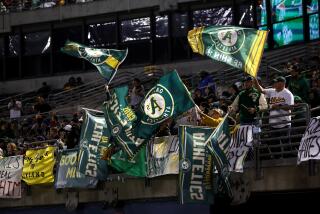If Cubs Make It, They Say Series Won’t Be at Wrigley
- Share via
CHICAGO — The Chicago Cubs announced Friday that if the ballclub qualified, it would not play its World Series contests at home “because of the light situation in Wrigley Field,” the last major league ballpark without lights.
General Manager Dallas Green said in a letter sent to season ticket-holders that “it is also possible” the team’s home dates in any National League Championship Series would be move elsewhere.
Earlier this year, Baseball Commissioner Peter Ueberroth informed the ballclub and its owners, Tribune Co., that ABC-TV, which will televise some post-season games, had decided to exercise an option in its contract with league owners to have all such games played at night.
Ueberroth did not specify lights as a solution to the problem in his letter.
He later urged the ballclub to seek a compromise with neighborhood groups that have opposed the installation of lights at the 70-year-old ballpark, citing noise and traffic problems.
Those groups, spearheaded by an organization called Citizens United for Baseball in the Sunshine, also have opposed the team’s lawsuit challenging the city and state laws.
The Cubs, who won the NL East Division last year, lost one home date in last year’s League Championship Series because of a lack of lights at Wrigley.
“We have now reached the point where it is too late to have permanent lights at Wrigley Field this year due to long lead times necessary in ordering specialized equipment,” Green said in his letter.
He added that “we don’t believe that temporary lights will work for major league baseball--maybe for college football and baseball--but not for us. . . .
“I’m not about to have amateur night with temporary lights and risk embarrassing the Cubs and City of Chicago in front of the entire nation.”
Temporary lights--to be moved in for post-series play--have been suggested as a compromise solution to the lights controversy.
Green said he had asked his staff to study the possibility of a new stadium for the team and to review possible sites, both within the city and the surrounding suburbs--a possibility he has raised several times in recent weeks.
“It is difficult to assess the chances of staying in Wrigley Field or the City of Chicago at this time,” he said. “Perhaps Wrigley Field is living on borrowed time and will become another Crosley Field (in Cincinnati), Forbes Field (in Pittsburgh) and Polo Grounds (in New York.)”
All three were abandoned on grounds they were outdated.
“We have a sense no one wants us to leave Wrigley Field,” Green said, “but quite honestly, actions speak louder than words and right now, no one seems to want to help us.”
More to Read
Go beyond the scoreboard
Get the latest on L.A.'s teams in the daily Sports Report newsletter.
You may occasionally receive promotional content from the Los Angeles Times.










